 We’re not even a handful of days into 2014 and already it’s looking to be a good one for Blu-rays and DVD. What’s got me in a celebratory mood? The Criterion Collection has stolen my heart with a gorgeous rendering of Michael Mann’s classic neo-noir Thief (1981), a movie that, until now, has been available primarily as a crap non-anamorphic DVD–which is to say it’s hardly existed at all. MGMHD telecasts whetted my appetite for something more fulfilling, and now we have this fine disc, a must-have for fans of what has quite deservedly become a cult film. This package should earn it some new admirers as well.
We’re not even a handful of days into 2014 and already it’s looking to be a good one for Blu-rays and DVD. What’s got me in a celebratory mood? The Criterion Collection has stolen my heart with a gorgeous rendering of Michael Mann’s classic neo-noir Thief (1981), a movie that, until now, has been available primarily as a crap non-anamorphic DVD–which is to say it’s hardly existed at all. MGMHD telecasts whetted my appetite for something more fulfilling, and now we have this fine disc, a must-have for fans of what has quite deservedly become a cult film. This package should earn it some new admirers as well.
Thief was one of those movies I missed theatrically, then watched obsessively on cable. Several things drew me to it. Years later I could see it as both kindred spirit and homage to the crime films of France’s Jean-Pierre Melville, like Le Samourai; back then, it was sharper, darker, and simply better observed than most films of its type, with an undertone of existential dread at odds with the sunny side up-ness of the early Reagan years. In that way, it was one of the last 70s films, a group of bleak no-hopers including Cruising, Heaven’s Gate, and Cutter’s Way; stylistically, it set a template that many other movies with slicker content followed in the 80s. Seventies star James Caan made only a half-dozen films in the 80s, this being the best; supporting his reforming safecracker, who finds that going legit an America where everything is for sale is near-impossible, are the elusive Tuesday Weld, who made the right call to appear in this film after turning down so many others, a poignant Willie Nelson, Jim Belushi and Dennis Farina at the start of their careers, and an unforgettable debut by Robert Prosky. Its brilliant electronic score, by Tangerine Dream, I eventually wore out on cassette tape–it sounds great here. Its star turn, however, is really by Mann, in his feature debut, who with cinematographer Donald Thorin and that music transformed workaday Chicago into a dangerously vibrant, neon-drenched noir-scape. Subconsciously movies like this and The Blues Brothers (1980), which anticipated the Second City’s renaissance as a filmmaking center in the mid- to late-80s, influenced my decision to attend college near there.
Mann’s often stellar career has been mitigated by a compulsion to redo some of his films on home video, for the worse (1992’s The Last of the Mohicans being the sorest thumb, with key music removed and other alterations). For Criterion he has, happily, corrected an editing flub or two within a director’s cut that first surfaced on laserdisc in 1995, making this a definitive presentation. The label has retained a Mann/Caan commentary from the LD (the actor rightly considers this his second-best movie after The Godfather) and added new interviews with both, plus a very informative piece with Tangerine Dream member Johannes Schmoelling about that ahead-of-its-time soundtrack. The group’s score for Mann’s disastrously received followup, The Keep (1983), is even better; never issued on DVD or Blu-ray, the film is an ideal project for Criterion, distributor Paramount, or some other enterprising label. Thief, however, makes for a happy new year.
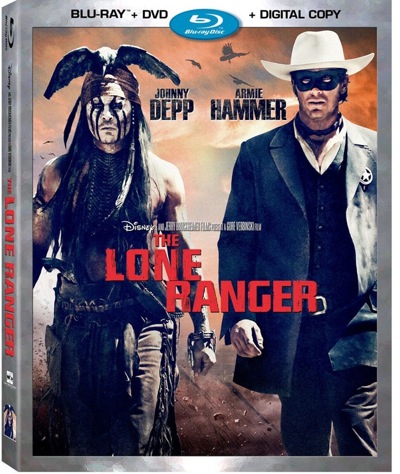 The holidays tend to leave us feeling fat, with clogged everything. Before going on that diet, however, you may want to check out The Lone Ranger, a movie conceived and bankrolled on a sugar high that faded as it hit theaters thicker with tumbleweeds than paying customers. Hammering the square peg of quaint characters forgotten since 1981’s flop The Legend of The Lone Ranger into the round hole of a tonally hopscotching riff on Sergio Leone’s spaghetti Westerns (with riffs on Ennio Morricone’s score for Once Upon a Time in the West outnumbering the customary “William Tell Overture”) was never really going to click as a live-action movie, at least as much as director Gore Verbinski and co-star Johnny Depp, of the Oscar-winning animated Western spoof Rango, hoped it would. All that expense did buy some arresting views of Monument Valley, cradle of the American Western (even if a few of them are digitally massaged, the hallmark of producer Jerry Bruckheimer), and there are a handful of good scenes, notably the mournful flashback to the source of the crackpot Tonto’s grief. But the emphasis on Depp’s eccentric (of course) Tonto over Armie Hammer’s uncertain Lone Ranger unbalances a movie that begins weirdly and crashes a train whenever momentum seems to flag, which is often enough over 150 minutes. (Extras are unsurprisingly meager, and emphasis the railroad action.) That said it’s better than Verbiniski’s dreary Pirates of the Caribbean sequels, so stuff yourself before slimming down–why, oh why, though, do the highest-profile flops tend to be Westerns (Heaven’s Gate, Wild Wild West), which further depresses the market for them?
The holidays tend to leave us feeling fat, with clogged everything. Before going on that diet, however, you may want to check out The Lone Ranger, a movie conceived and bankrolled on a sugar high that faded as it hit theaters thicker with tumbleweeds than paying customers. Hammering the square peg of quaint characters forgotten since 1981’s flop The Legend of The Lone Ranger into the round hole of a tonally hopscotching riff on Sergio Leone’s spaghetti Westerns (with riffs on Ennio Morricone’s score for Once Upon a Time in the West outnumbering the customary “William Tell Overture”) was never really going to click as a live-action movie, at least as much as director Gore Verbinski and co-star Johnny Depp, of the Oscar-winning animated Western spoof Rango, hoped it would. All that expense did buy some arresting views of Monument Valley, cradle of the American Western (even if a few of them are digitally massaged, the hallmark of producer Jerry Bruckheimer), and there are a handful of good scenes, notably the mournful flashback to the source of the crackpot Tonto’s grief. But the emphasis on Depp’s eccentric (of course) Tonto over Armie Hammer’s uncertain Lone Ranger unbalances a movie that begins weirdly and crashes a train whenever momentum seems to flag, which is often enough over 150 minutes. (Extras are unsurprisingly meager, and emphasis the railroad action.) That said it’s better than Verbiniski’s dreary Pirates of the Caribbean sequels, so stuff yourself before slimming down–why, oh why, though, do the highest-profile flops tend to be Westerns (Heaven’s Gate, Wild Wild West), which further depresses the market for them?
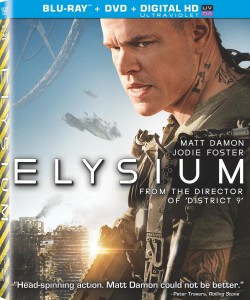 The Lone Ranger isn’t the worst movie I saw from last year, though it did make a few Flop Ten lists. Making everyone’s Most Disappointing List, however, was Elysium, an Earth vs. the 1 percent sci-fi spectacle that rips apart as many bodies as The Lone Ranger does freight cars. Yes, the Blu-ray makes for state-of-the-art demo material on your home theater setup (so does The Lone Ranger), but more was expected from filmmaker Neil Blomkamp, of the Oscar-nominated surprise hit District 9 (2009). I found the racial politics of that one slippery; Elysium (which breaks the rule, “Never give a film a name a general audience can’t pronounce or define,” not that it did so badly), suffers from a simplistic take on class warfare, with Latino-tinged grunt Matt Damon zooming into space to confront snooty, French-speaking Jodie Foster and her minions and bring universal health care to us from the heavens. Much carnage ensues. I’d give Blomkamp the benefit of the doubt and say this looks to be like a ten-hour European miniseries that got dumbed down into a two-hour Hollywood action flick, but I think the latter was what he was going for, under the guise of “saying something.” We weren’t fooled; the extensive, and well-produced, supplementary material, lets him speak at length about what he intended.
The Lone Ranger isn’t the worst movie I saw from last year, though it did make a few Flop Ten lists. Making everyone’s Most Disappointing List, however, was Elysium, an Earth vs. the 1 percent sci-fi spectacle that rips apart as many bodies as The Lone Ranger does freight cars. Yes, the Blu-ray makes for state-of-the-art demo material on your home theater setup (so does The Lone Ranger), but more was expected from filmmaker Neil Blomkamp, of the Oscar-nominated surprise hit District 9 (2009). I found the racial politics of that one slippery; Elysium (which breaks the rule, “Never give a film a name a general audience can’t pronounce or define,” not that it did so badly), suffers from a simplistic take on class warfare, with Latino-tinged grunt Matt Damon zooming into space to confront snooty, French-speaking Jodie Foster and her minions and bring universal health care to us from the heavens. Much carnage ensues. I’d give Blomkamp the benefit of the doubt and say this looks to be like a ten-hour European miniseries that got dumbed down into a two-hour Hollywood action flick, but I think the latter was what he was going for, under the guise of “saying something.” We weren’t fooled; the extensive, and well-produced, supplementary material, lets him speak at length about what he intended.
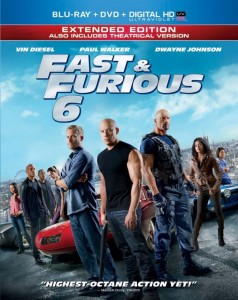 With Vin Diesel, you pretty much know what you’re going to get going in–he doesn’t lose sleep about saying something, or saying much at all. Currently the eighth biggest hit of 2013, Fast & Furious 6 should be enjoying a victory lap on home video, as the 12-year-old series continues to gain in boxoffice and, in some quarters, critical acclaim. Co-star Paul Walker’s death in a car accident, however, has cast a pall over this installment and the series, which will continue. A shame, as the movies are indeed fast and furious, and easy to take, even if this one has nothing quite so nutty as the safe dragging in Fast Five. And they do make for excellent Blu-ray fodder, with this one (touting a barely “extended” edition) given the full complement of flashy extras including the expected car porn. Unexpected is the catch in one’s throat whenever Walker appears in the supplements, clearly ready to vroom into the next one.
With Vin Diesel, you pretty much know what you’re going to get going in–he doesn’t lose sleep about saying something, or saying much at all. Currently the eighth biggest hit of 2013, Fast & Furious 6 should be enjoying a victory lap on home video, as the 12-year-old series continues to gain in boxoffice and, in some quarters, critical acclaim. Co-star Paul Walker’s death in a car accident, however, has cast a pall over this installment and the series, which will continue. A shame, as the movies are indeed fast and furious, and easy to take, even if this one has nothing quite so nutty as the safe dragging in Fast Five. And they do make for excellent Blu-ray fodder, with this one (touting a barely “extended” edition) given the full complement of flashy extras including the expected car porn. Unexpected is the catch in one’s throat whenever Walker appears in the supplements, clearly ready to vroom into the next one.
The eight minutes of footage added to Riddick, Diesel’s other franchise, more fully decouple it from the 2004 flop The Chronicles of Riddick, an unwise attempt to refashion the likably grotty Pitch Black (2000) into a PG-13 Lord of the Rings deal. Such is Diesel’s clout that we have another, which plunks his terse malcontent on another hostile planet teeming with “mud demons,” reptilian vultures, and rival teams of bounty hunters and mercenaries, included Katee Sackhoff, beloved on Battlestar Galactica and 24. In other words, more of the same that got us interested in the first place, with, umm, faster and more “Furyan” action on a similarly frugal budget. Nothing groundbreaking here, including a standard set of making-of extras, but it holds the course should there be another for Diesel and writer/director David Twohy, and the A/V trips the night vision fantastic.
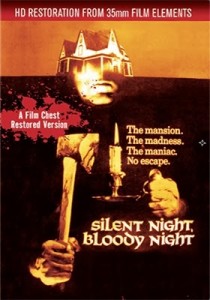 Winter’s chill…It’s pretty much too late to get in a few seasonal words about the DVD of 1972’s Silent Night, Bloody Night, though I prefer to think I’m much too early. However you look at it, know that when I was a kid, WOR-9 in New York showed this thriller, and other early 70s genre things like Beware! The Blob, The House of Seven Corpses, and Lemora: The Lady Dracula year-round in commercials-ridden two-hour timeslots. I did the work to enjoy them as much as I could. Silent Night was a challenge; at 81 minutes or so there was a lot of room for ads, and the movie is stronger on low-fi atmosphere than on anything else. It’s best watched unbroken, which this Film Chest DVD, after so many ripoff public domain versions, allows us to do for the second time. (The same restored transfer, under the name Deathouse, appeared earlier in 2013 on a Code Red DVD, paired with the inimitable Invasion of the Blood Farmers; to my eye this one, also, blessedly, anamorphic widescreen, is a bit darker and moodier.) An old dark house and environs story that mixes veteran character actors Patrick O’Neal, John Carradine, and Walter Abel with Warhol “superstars” like Mary Woronov, Ondine, and Candy Darling, it has some morbid twists that a more polished production might have really run with; still, it intrigues, and the two-pronged rescue effort is welcome (more so than a recent, said to be terrible, remake).
Winter’s chill…It’s pretty much too late to get in a few seasonal words about the DVD of 1972’s Silent Night, Bloody Night, though I prefer to think I’m much too early. However you look at it, know that when I was a kid, WOR-9 in New York showed this thriller, and other early 70s genre things like Beware! The Blob, The House of Seven Corpses, and Lemora: The Lady Dracula year-round in commercials-ridden two-hour timeslots. I did the work to enjoy them as much as I could. Silent Night was a challenge; at 81 minutes or so there was a lot of room for ads, and the movie is stronger on low-fi atmosphere than on anything else. It’s best watched unbroken, which this Film Chest DVD, after so many ripoff public domain versions, allows us to do for the second time. (The same restored transfer, under the name Deathouse, appeared earlier in 2013 on a Code Red DVD, paired with the inimitable Invasion of the Blood Farmers; to my eye this one, also, blessedly, anamorphic widescreen, is a bit darker and moodier.) An old dark house and environs story that mixes veteran character actors Patrick O’Neal, John Carradine, and Walter Abel with Warhol “superstars” like Mary Woronov, Ondine, and Candy Darling, it has some morbid twists that a more polished production might have really run with; still, it intrigues, and the two-pronged rescue effort is welcome (more so than a recent, said to be terrible, remake).
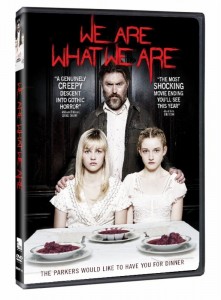 Not all remakes are rubbish, however. The Mexican-made We Are What We Are (2010) is a standout in modern horror, and its English-language redo is up there with it. Which isn’t out of the blue; its writer/director, Jim Mickle, has established his bonafides in the genre with movies like Stake Land (2011). That didn’t quite come off, but with a blueprint to follow and an affinity for its dark, themes, his take on We Are What We Are is a success, with a few shifts in the characterizations and an emphasis on family rather than economic values. Relocated to the backwoods, the film stars Bill Sage (Boardwalk Empire) as Frank, who is schooling his teenage daughters Iris (Ambyr Childers, The Master) and Rose (Julia Garner, The Perks of Being a Wallflower) in the family way–which for matters of, err, taste and discretion I will not reveal. A storm that threatens to uncover evidence of past misdeeds and the suspicions of a neighbor (Mickle regular Kelly McGillis) and the town doctor (played by Michael Parks, indie horror’s good luck charm) allow the girls, who miss their late mother and aren’t crazy about certain preparatory chores, to turn the tables as the American gothic plays out. The filmmaker wisely keeps the spigot on low for much of the tale, allowing the fiercely committed performers to establish a mood of dread and unease before the blood flows. You’ll hear from them on the audio commentary and interview featurettes on the DVD, which also includes a good making-of documentary. Horror fans will eat this one up.
Not all remakes are rubbish, however. The Mexican-made We Are What We Are (2010) is a standout in modern horror, and its English-language redo is up there with it. Which isn’t out of the blue; its writer/director, Jim Mickle, has established his bonafides in the genre with movies like Stake Land (2011). That didn’t quite come off, but with a blueprint to follow and an affinity for its dark, themes, his take on We Are What We Are is a success, with a few shifts in the characterizations and an emphasis on family rather than economic values. Relocated to the backwoods, the film stars Bill Sage (Boardwalk Empire) as Frank, who is schooling his teenage daughters Iris (Ambyr Childers, The Master) and Rose (Julia Garner, The Perks of Being a Wallflower) in the family way–which for matters of, err, taste and discretion I will not reveal. A storm that threatens to uncover evidence of past misdeeds and the suspicions of a neighbor (Mickle regular Kelly McGillis) and the town doctor (played by Michael Parks, indie horror’s good luck charm) allow the girls, who miss their late mother and aren’t crazy about certain preparatory chores, to turn the tables as the American gothic plays out. The filmmaker wisely keeps the spigot on low for much of the tale, allowing the fiercely committed performers to establish a mood of dread and unease before the blood flows. You’ll hear from them on the audio commentary and interview featurettes on the DVD, which also includes a good making-of documentary. Horror fans will eat this one up.
 With horror films new and old, and popular and obscure, being reimagined left and right I’m a little shocked no one’s gotten to The Beast Within (1982) or Crawlspace (1986) yet. Then again, they’re both so gamy and of their era, with certain hard-to-replicate elements, that maybe they’re best left in the catacombs…and on Scream Factory Blu-ray, where their rancid charms will captivate buffs as never before. A 50s style monster-on-the-loose opus brought up-to-date with familiar faces (Ronny Cox and Don Gordon among them, and, yes, that’s Meshach Taylor a few years before Designing Women) and a lot of Southern-fried rape and grunge, The Beast Within idles humidly after a grisly opening before opening up the throttle on some truly alarming monster effects, with the head of the cursed 18-year-old at the center of the story (played by Paul Clemens, who wrote about these flicks for Famous Monsters of Filmland magazine before starring in one, my dream) expanding into killer insectoid proportions for a final spree. Great stuff, that’s finally easy to see given a superior transfer. Clemens, director Philippe Mora (who graduated to daffy sequels to The Howling, another Scream Factory Blu), and writer Tom Holland (who would go on to write and direct the more noted Fright Night and Child’s Play) participate in commentary tracks, justifiably unashamed of a singular achievement.
With horror films new and old, and popular and obscure, being reimagined left and right I’m a little shocked no one’s gotten to The Beast Within (1982) or Crawlspace (1986) yet. Then again, they’re both so gamy and of their era, with certain hard-to-replicate elements, that maybe they’re best left in the catacombs…and on Scream Factory Blu-ray, where their rancid charms will captivate buffs as never before. A 50s style monster-on-the-loose opus brought up-to-date with familiar faces (Ronny Cox and Don Gordon among them, and, yes, that’s Meshach Taylor a few years before Designing Women) and a lot of Southern-fried rape and grunge, The Beast Within idles humidly after a grisly opening before opening up the throttle on some truly alarming monster effects, with the head of the cursed 18-year-old at the center of the story (played by Paul Clemens, who wrote about these flicks for Famous Monsters of Filmland magazine before starring in one, my dream) expanding into killer insectoid proportions for a final spree. Great stuff, that’s finally easy to see given a superior transfer. Clemens, director Philippe Mora (who graduated to daffy sequels to The Howling, another Scream Factory Blu), and writer Tom Holland (who would go on to write and direct the more noted Fright Night and Child’s Play) participate in commentary tracks, justifiably unashamed of a singular achievement.
Crawlspace could never really be remade, as its star, Klaus Kinski, is irreplaceable. He’s most of the show in this bracing tale of terror, which is confined to a few small rooms as his character, an outwardly solicitous landlord with hidden Nazi predilections, peeps on and dispatches his comely female tenants. (The “final girl” is played by Talia Balsam, the ex-Mrs. George Clooney, who now appears on Mad Men with her longtime husband John Slattery.) David Schmoeller’s termite-scaled movie is pretty much a vehicle for Kinski, who rants before films of Nazi rallies, puts on lipstick, advises the mute victim of one of his experiments to “smile more often,” and generally gives the performance of your nightmares–and Schmoeller’s, who dishes the dirt about his erratic star in an amusing (for us) featurette, “Please Kill Mr. Kinski,” and on an audio commentary. (Makeup artist John Vulich, later to win Emmys for TV’s Buffy the Vampire Slayer, The X-Files, and Babylon 5, is also on hand to chat about the film’s production on a soundstage in Rome.)
[youtube width=”602″ height=”350″ video_id=”__ySsCuZPMM”]Finally, a flurry of discs from Asia, where Run Run Shaw of the legendary Shaw Brothers studio has passed at age 106. There’s something for all tastes from the Far East these days. While we await the US premiere of Hayao Miyazaki’s last film, The Wind Rises, next month, enjoy the latest release from his Studio Ghibli, the nicely observed From Up on Poppy Hill, set amidst the 1964 Tokyo Olympics. Not to be confused with F. Scott Fitzgerald, The Last Tycoon reteams the great Chow Yun-Fat (The Killer, Crouching Tiger, Hidden Dragon) with the crazy-quilt director Wong Jing, of his smash hit God of Gamblers (1989), for a true-ish, Shanghai-set gangland saga featuring the equally wonderful Sammo Hung; it’s more fun than the dull De Niro movie made from the book anyway. Did you like Wong Kar-wai’s The Grandmaster? The story of martial artist Ip Man gets another go-round in The Final Fight, a melancholy chapter in the oft-told saga with a fine performance by Anthony Wong, who starred in many a “Category III” shocker when I lived in Hong Kong in the early 90s. And Drug War, a strong outing from the veteran Hong Kong director Johnnie To, fared surprisingly well on Top Ten lists and received a few nods from critics groups, including three from my own, the Online Film Critics Society. Deservedly so–the story of a mainland meth ring rocked by undercover skullduggery builds tremendous intensity.
 And the hits keep coming, almost always with making-of docs and trailers. (If you can’t find them in stores, look for them on Netflix Instant and other streaming services.) Taiwan’s Jay Chou didn’t generate much buzz as Kato in The Green Hornet (2011), but in Asia he’s a multihyphenate megastar, and The Rooftop shows why. Chou wrote, directed, stars in and composed the score for this anything-goes musical, set in a fantasy city where lowborn carefree types sing and dance on the rooftops, while hard-bitten mobsters on the ground floor conspire. When Chou’s musically inclined layabout falls for a pretty billboard model, trouble, and song and dance numbers, follow. If Justin Bieber made a film like this it would be crucified as a vanity project; this is Chou’s second hugely successful movie, and our unfamiliarity with him makes it easier to enjoy than condemn, if at a little over two hours our patience is stretched by bursts of unevenness and his everything-plus-the-kitchen-sink (afros, bowling, etc.) approach. Its too-muchness is part of its appeal, however, and HK movie and music fans will enjoy a parade of cameos.
And the hits keep coming, almost always with making-of docs and trailers. (If you can’t find them in stores, look for them on Netflix Instant and other streaming services.) Taiwan’s Jay Chou didn’t generate much buzz as Kato in The Green Hornet (2011), but in Asia he’s a multihyphenate megastar, and The Rooftop shows why. Chou wrote, directed, stars in and composed the score for this anything-goes musical, set in a fantasy city where lowborn carefree types sing and dance on the rooftops, while hard-bitten mobsters on the ground floor conspire. When Chou’s musically inclined layabout falls for a pretty billboard model, trouble, and song and dance numbers, follow. If Justin Bieber made a film like this it would be crucified as a vanity project; this is Chou’s second hugely successful movie, and our unfamiliarity with him makes it easier to enjoy than condemn, if at a little over two hours our patience is stretched by bursts of unevenness and his everything-plus-the-kitchen-sink (afros, bowling, etc.) approach. Its too-muchness is part of its appeal, however, and HK movie and music fans will enjoy a parade of cameos.
Another shaking and baking of genre tropes is Badges of Fury, which sounds like a Will Ferrell movie, and might have been one. Think The Other Guys (2010) set in Hong Kong, without, however, many laughs and indeed a few groans, as Jet Li, finally betraying his age, plays a weary detective trailing an actress involved in a bizarre series of “smile murders” with the hindrance of help from two incompetents on the force. It’s almost entirely witless (with cartoon noises added to punch up gags) and, worse, largely unexciting on the fighting front, with Li, 50, clearly doubled for a few shots. I’d have asked for a few doubles myself to get through a third-rate as assignment like this one.
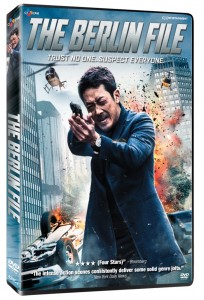 After Private Ryan and Mr. Banks we have Saving General Yang–needless to say, Tom Hanks is nowhere to be found in a potboiling folkloric epic directed by Ronny Yu, who made his bones with Hong Kong fantasies like The Bride with White Hair (1993) before a Hollywood sojourn that yielded Bride of Chucky (1998) and Freddy vs. Jason (2003). Fortunately for one’s reputation you can go home again, and while the movie (about seven brothers who unite to rescue their warlord father from enemies) isn’t a knockout it’s not 47 Ronin, either. The film is colorfully produced and Yu stages the action inventively.
After Private Ryan and Mr. Banks we have Saving General Yang–needless to say, Tom Hanks is nowhere to be found in a potboiling folkloric epic directed by Ronny Yu, who made his bones with Hong Kong fantasies like The Bride with White Hair (1993) before a Hollywood sojourn that yielded Bride of Chucky (1998) and Freddy vs. Jason (2003). Fortunately for one’s reputation you can go home again, and while the movie (about seven brothers who unite to rescue their warlord father from enemies) isn’t a knockout it’s not 47 Ronin, either. The film is colorfully produced and Yu stages the action inventively.
The Berlin File, from Korea, does not lack for action, telling the tale of a North Korean agent and his translator wife who lam it from North and South Korean agents and assassins when his cover is blown in Germany. While convoluted in a spy vs. spy way it’s also fleetly executed, with some nifty setpieces on par with a Bourne movie, a poignant central relationship, and a feel for current events as Kim Jong-un keeps moving the pieces on his chessboard. With this film, which received a limited release here last year, as his calling card, I expect director Ryoo Seung-wan (also noted for 2006’s The City of Violence) to “defect” to Hollywood shortly.





Comments